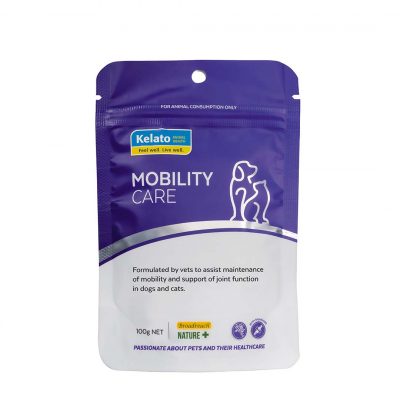Joint care. Did you know it’s not just for older, stiff dogs? Puppies, adolescent dogs and adult dogs (not yet classed as seniors) all need a little helping hand with their joints too.
Top tips for caring for your dog’s joint issues
When your dog is enjoying its younger years, it’s important to care for their joints to help prevent issues when they are older and more senior.
Ways to do this include:
- Diet – feeding them good quality food that is well-balanced in all the vitamins and minerals that your fluffy friend needs
- Exercise – excess weight adds pressure to your dog’s joints so making sure they get enough exercise is important. Don’t over-exercise them though!
- Warmth – cold, damp and windy conditions can aggravate the joints of your beloved pet, so it’s important to keep your dog’s bed in a warm place in your home. For winter walks, depending on the breed of your dog, you may also need to invest in a warm dog coat or jumper
- Cosy – the dog bed you choose is also important, and possibly more important than you might have first thought. A good quality, comfortable dog bed will help rest your dog’s joints
Tips by age
Along with the general tips above, there are some things to consider depending on the age of your dog…
Joint Care Tips for Puppies
As a puppy, your new best friend’s joints are still developing and the breed of your dog depends on how long it will take for their bones, joints and tendons to develop – as a general rule, large breeds take longer – no surprises there!
With your pet’s joints still developing, it is important to do everything you can to protect them at this fragile stage, with the biggest piece of advice being…
Do not over-exercise your puppy!
You also need to make sure you are careful when playing with them so it is not too rough and you should limit the amount of jumping they do – don’t let them take big leaps off the sofa or run up and down the stairs too much.
You should also not leave them alone to play with older dogs. If you want to introduce your puppy to some new canine friends, as socialisation is important, make sure it is not for too long and you keep a close eye on them.
The other thing you should do is speak to your vet about making sure your puppy is getting the right nutritional support to help with their joint care. Your vet may recommend you introduce some natural joint supplements such as Kelato’s MOBILITY CARE, for your puppy to help give them an extra boost.
Joint Care Tips for Adolescent Doggies
Just like us humans, your pooch will have a teenage phase and it is important to not strain their joints during this time. The top tip here is similar to that of when they’re a puppy – don’t over-exercise them – but with an added piece of advice…focus on mentally stimulating them with brain games. Scattering activity toys and puzzle feeders will help to keep their minds busy.

Joint Care Tips for Adult Dogs
This is where the advice is different for different dogs.
Active
With dogs that are super-duper active, it is really important to support their lifestyle and prevent future health problems. As above, a well-balanced diet will need to be a big part of this, but natural joint supplements such as MOBILITY CARE can offer advanced support to keep your furry friend agile.


If your dog enjoys sports such as joining you on a run, it is also important to keep your sessions somewhat short – think short and often rather than long and one-off – and remember to not overdo it too soon. Dogs are ready for more activity once they have hit the 18 month old mark.
Stiffness
Lagging on walks, sleeping more often and for longer, taking longer to stand up and a new reluctance to go for walkies are all signs that your dog may be suffering from stiffness in their joints.
With most ailments, it’s always best to consult your vet. Your beloved pet may need a helping hand from veterinary-approved supplements like our MOBILITY CARE, perfect for dogs showing the first signs of stiffness. This joint supplement can be easily mixed into food for the long term. It might also be worth taking your dog for some hydrotherapy. Water exercise is great for dogs suffering from stiffness as it allows them to exercise without pressure being placed on their joints from their weight.
Joint Care Tips for Older dogs
Daily exercise is still important even when your dog becomes more senior. As your dog gets older, it is easier for them to put weight on which can add pressure to their joints. So keep taking your furry friend on walkies but make sure they’re shorter and more frequent walks, and on easy terrain – something with less resistance, such as pathways or short grass.

Want to find out more? Head to the MOBILITY CARE page, get in touch on 1800 KELATO or email our team at petcare@kelato.com.au.
Written for Broadreach Nature by In House Veterinary Expert Dr Barbara Fougere (BSc BVMS (Hons) MODT MHSc (Herb Med) BHSc (Comp Med) Adv Dip WHM, Grad Dip VCHM, Grad Dip VWHM, Grad Dip VA).
Dr Barbara Fougere graduated from Murdoch in 1986 and her integrative practice is based in Sydney Australia. She is a lead faculty member for the College of Integrative Veterinary Therapies and lectures on integrative medicine all over the world.







